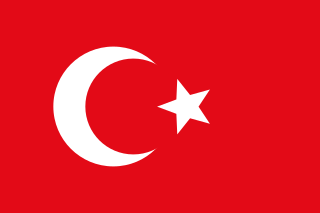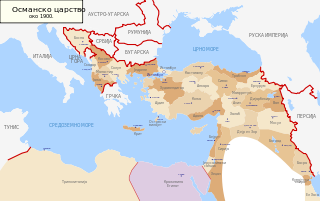Related Research Articles

The Ottoman Empire, also known as the Turkish Empire, was an empire that controlled much of Southeast Europe, Western Asia, and Northern Africa between the 14th and early 20th centuries. It was founded at the end of the 13th century in northwestern Anatolia in the town of Söğüt by the Turkoman tribal leader Osman I. After 1354, the Ottomans crossed into Europe and, with the conquest of the Balkans, the Ottoman beylik was transformed into a transcontinental empire. The Ottomans ended the Byzantine Empire with the conquest of Constantinople in 1453 by Mehmed the Conqueror.

Bernard Lewis, was a British American historian specialized in Oriental studies. He was also known as a public intellectual and political commentator. Lewis was the Cleveland E. Dodge Professor Emeritus of Near Eastern Studies at Princeton University. Lewis's expertise was in the history of Islam and the interaction between Islam and the West.

Young Turks was a political reform movement in the early 20th century that favored the replacement of the Ottoman Empire's absolute monarchy with a constitutional government. They led a rebellion against the absolute rule of Sultan Abdulhamid II in the 1908 Young Turk Revolution. With this revolution, the Young Turks helped to establish the Second Constitutional Era in the same year, ushering in an era of multi-party democracy for the first time in the country's history.
Justin A. McCarthy is an American demographer, professor of history at the University of Louisville, in Louisville, Kentucky. He holds an honorary doctorate from Boğaziçi University (Turkey), was awarded the Order of Merit of Turkey, and is a board member of the Institute of Turkish Studies and the Center for Eurasian Studies (AVIM). His area of expertise is the history of the late Ottoman Empire.

Armenian genocide denial is the claim that the Ottoman Empire and its ruling party, the Committee of Union and Progress (CUP), did not commit genocide against its Armenian citizens during World War I—a crime documented in a large body of evidence and affirmed by the vast majority of scholars. The perpetrators denied the genocide as they carried it out, claiming Armenians were resettled for military reasons, not exterminated. In the genocide's aftermath, incriminating documents were systematically destroyed, and denial has been the policy of every government of the Republic of Turkey, as of 2022.
The Malta exiles were the purges of Ottoman intellectuals by the Allied forces. The exile to Malta occurred between March 1919 and October 1920 of politicians, high ranking soldiers (mainly), administrators and intellectuals of the Ottoman Empire after the armistice of Mudros during the Occupation of Istanbul by the Allied forces. The Malta exiles became inmates in a British prison where various Committee of Union and Progress (CUP) officials were held in the hopes that trials will be held at the Malta Tribunals at a future date.

The Istanbul trials of 1919–1920 were courts-martial of the Ottoman Empire that occurred soon after the Armistice of Mudros, in the aftermath of World War I. The leadership of the Committee of Union and Progress (CUP) and selected former officials were charged with several charges including subversion of the constitution, wartime profiteering, and the massacres of both Armenians and Greeks. The court reached a verdict which sentenced the organizers of the massacres – Talat, Enver, and Cemal – and others to death.
After World War I, the effort to prosecute Ottoman war criminals was taken up by the Paris Peace Conference (1919) and ultimately included in the Treaty of Sèvres (1920) with the Ottoman Empire. The Ottoman government organized a series of courts martial in 1919–1920 to prosecute war criminals, but these failed on account of political pressure. The main effort by the Allied administration that occupied Constantinople fell short of establishing an international tribunal in Malta to try the so-called Malta exiles, Ottoman war criminals held as POWs by the British forces in Malta. In the end, no tribunals were held in Malta.
Ronald Grigor Suny is an American historian and political scientist. Suny is the William H. Sewell Jr. Distinguished University Professor of History at the University of Michigan and served as director of the Eisenberg Institute for Historical Studies, 2009 to 2012 and was the Charles Tilly Collegiate Professor of Social and Political History at the University of Michigan from 2005 to 2015, and is Emeritus Professor of political science and history at the University of Chicago.

Stanford Jay Shaw was an American historian, best known for his works on the late Ottoman Empire, Turkish Jews, and the early Turkish Republic. Shaw's works have been criticized for their lack of factual accuracy as well as denial of the Armenian genocide, and other pro-Turkish bias.
Heath Ward Lowry is the Atatürk Professor of Ottoman and Modern Turkish Studies emeritus at Princeton University and Bahçeşehir University. He is an author of books about the history of the Ottoman Empire and Modern Turkey.
Edward J. Erickson is a retired regular U.S. Army officer at the Marine Corps University who has written widely on the Ottoman Army during World War I. He is an associate of International Research Associates, Seattle, Washington and as of July 2016 was also listed as an advisory board member of the Ankara-based, Turkish government aligned think-tank, Avrasya Incelemeleri Merkezi (AVIM), which goes by the English name Center for Eurasian Studies.
Donald George Quataert was a historian at Binghamton University. He taught courses on Middle East/Ottoman history, with an interest in labor, social and economics, during the early and modern periods. He also provided training in the reading of Ottoman archival sources.

This is a bibliography of notable works about the Ottoman Empire.
Levon Marashlian is an American historian, professor, and scholar. His scholarly work has largely focused on Armenian, Russian, and Middle-Eastern history. He has participated in various debates, lectures, and conferences throughout the world. He is currently a professor of history at Glendale Community College.

Hafız Mehmet was a Turkish politician and the Minister of Justice for the Republic of Turkey. While serving as a deputy in Trabzon, he was a witness to the Armenian genocide. His testimony of the event is considered by genocide scholar Vahakn Dadrian as one of the "rarest corroborations of the fact of the complicity of governmental officials in the organization of the mass murder of Armenians". He was sentenced to death after the Izmir trials of 1926, charged with attempting to assassinate Mustafa Kemal Atatürk.
Marc David Baer is a Jewish American historian and Professor of International History at the London School of Economics and Political Science.
Ottoman studies is an interdisciplinary branch of the humanities that addresses the history, culture, costumes, religion, art, such as literature and music, science, economy, and politics of the Ottoman Empire. It is a sub-category of Oriental studies and Middle Eastern studies, and also Turkish studies.
The question of who was responsible for starting the burning of Smyrna continues to be debated, with Turkish sources mostly attributing responsibility to Greeks or Armenians, and vice versa. Other sources, on the other hand, suggest that at the very least, Turkish inactivity played a significant part on the event.
The terminology of the Armenian genocide is different in English, Turkish, and Armenian languages and has led to political controversies around the issue of Armenian genocide denial and Armenian genocide recognition. Although the majority of historians writing in English use the word "genocide", other terms exist.
References
- ↑ "Turkey's Take Back," Inside Higher Ed. December 22, 2015. Retrieved December 22, 2015.
- ↑ Smith, Roger W., Eric Markusen, and Robert Jay Lifton, "Professional Ethics and Denial of the Armenian Genocide," in Remembrance and Denial: The Case of the Armenian Genocide, ed. Richard G. Hovannisian. Detroit: Wayne State University Press, 1999, p. 274. ISBN 0-8143-2777-X.
- ↑ Trinkle, Dennis A. The History Highway, M.E. Sharpe, 2006. p. 124. ISBN 0-7656-1631-9.
- ↑ Drobnicki, John A., and Richard Asaro, "Historical Fabrications on the Internet: Recognition, Evaluation, and Use in Bibliographic Instruction," in Di Su (ed.), Evolution in Reference and Information Services. Binghamton, New York: Haworth Press, 2001, ISBN 0-7890-1723-7, p. 136
- ↑ Alan Fisher, "Letter to the Editor", The New York Times, May 28, 1996.
- 1 2 "Institute of Turkish Studies". Archived from the original on 2008-06-21. Retrieved 2008-10-12.
- ↑ MacDonald, David B. Identity Politics in the Age of Genocide, p.121. Routledge, 2008. ISBN 0-415-43061-5.
- ↑ Peterson, Merrill D. "Starving Armenians", p.173. University of Virginia Press, 2004. ISBN 0-8139-2267-4.
- ↑ Auron, Yair. The Banality of Denial, p.52. Transaction Publishers, 2004. ISBN 0-7658-0834-X.
- ↑ Basbanes, Nicholas A. Patience & Fortitude, p.328-329. HarperCollins, 2003. ISBN 0-06-051446-9
- ↑ Baets, Antoon de. Censorship of Historical Thought, p.472. Greenwood Publishing Group, 2002. ISBN 0-313-31193-5.
- 1 2 3 Susan Kinzie (July 5, 2008). "Board Members Resign to Protest Chair's Ousting". The Washington Post .